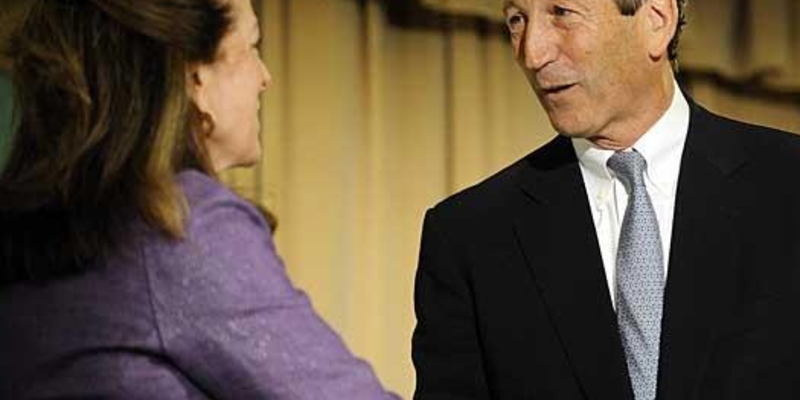

Let’s put this plainly. Candidates Elizabeth Colbert-Busch and Mark Sanford had a debate Monday. They are both running for the recently vacated 1st congressional district seat in the United States House of Representatives. Their goal was to debate the issues which will pass under the consideration of the eventual Congressman/woman.
They did not trade jabs. They did not land blows. They stood behind lecterns and talked. Were they literally trading jabs (and honoring the legacy of former U.S. Representative and South Carolinian Preston Brooks in the process), we should evaluate their efforts in that context. They were not. They were standing behind lecterns and talking. Judging the success of the debate as the extent to which the means (talking) achieved the proposed ends (presenting arguments on the issues), this debate—like almost every other modern debate involving public office—failed.
Why?
One, there were two candidates on the stage. Green Party candidate Eugene Platt was not invited despite his inclusion on the ballot May 7. This is not an endorsement for the Green Party or Eugene Platt, but a remark on the binary dynamic created when the spectrum of disagreement is limited to two perspectives. According to conventional political wisdom, all manner of political thought and solutions fall somewhere within this sliding scale of sanctioned party philosophy. The notion that complex issues of the kind encountered by our public officials can be distilled into two equally opposite solutions is one of the most ignorant and dangerous patterns of thought exhibited in America today; ignorant because of the underutilization of science and the humanities as a template of human behavior and source of perspective, and dangerous because this limitation necessarily means the consolidation of political power. James Madison himself cites diversity of opinion as a defense against consolidated and abused authority in Federalist 51:
"Whilst all authority in [the federal republic] will be derived from and dependent on the society, the society itself will be broken into so many parts, interests, and classes of citizens, that the rights of individuals, or of the minority, will be in little danger from interested combinations of the majority."
Also, political philosophies and solutions are distilled like a spirit, passing through party test after test until the result is a highly potent and easily abused product. Meanwhile, the public, in their drunkenness, ignore other options. Candidates’ responses to moderator questions register to the voter as either “agree” or “disagree” with no honest attempt to justify or explain their position. Colbert-Busch was fascinating to watch as she—untrained in the politician’s craft—mostly answered the questions put to her directly and with little rhetorical flourish. The result was expectant silence as the audience waited for her to fill time by citing some obscure legislation or pointing out someone in the crowd to segue into a humanizing anecdote. There was almost nothing in the way of probing, thought-provoking questions on “why” or “how,” just “who” and “what.”
Why is this? Why are the questions simple, the time given to answer short, and the follow-up questions insubstantial? The stated goal for the debate, discussing the issues, is far from the actual goal of modern political debates. The goal is not to argue for a candidate’s position, but to secure a vote. The focus is not on issues, but on individuals.
On the surface, this seems sensible enough: “I need to know this politician will vote in a manner that is most beneficial for his or her constituency.” The problem is the criteria by which the voter judges which candidate is best. In these debates, the criteria are the candidates’ “stances” on the issues. These “stances” are simply conclusions. Therefore, we judge the candidates based upon the conclusions they have reached.
The positions the candidates parroted to the audience Monday are their conclusions, but as any logician can tell you, false conclusions can come from true premises and true conclusions can come from false premises, depending on structural errors in the argument. It is crucial to see the nuts and bolts of why and how a candidate has decided that unions are bad for business or extended background checks on gun purchases will decrease gun deaths. By depriving voters of the logic and reason by which public servants have reached their conclusions, we have no insight into how good or bad the decisions they make in office will be.
It is the way in which a candidate works through problems that is important. Voters will never be privy to all the information (classified or otherwise) a representative or senator encounters over the course of his or her time in office. We can only have the assurance that when presented with said information, our elected officials will have the ability to use their wisdom, judgement, and reason to make the best choice.
Ask yourself, if you turned in a high school term paper with a conclusion and no support, what grade would you get? If it doesn’t pass inside the classroom, why should it pass outside?
Photo credit: U.S. News